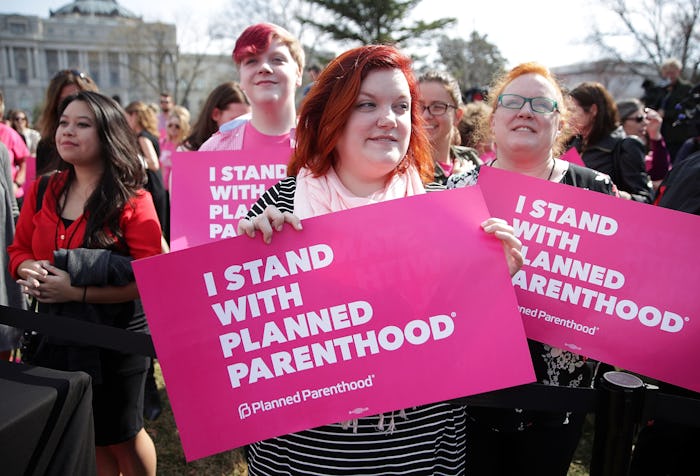Life

Title X State Funding & Why Cutting It Could Spell Disaster
The United States Senate recently voted to reverse a rule that prohibited states from depriving health care providers of federal funds for any reason other than the quality of care they provide. Immediately, pro-choice advocates recognized this move for what it was: a Republican effort to divert taxpayer money from Planned Parenthood and other abortion providers. That's because, if President Donald Trump signs the measure — which he's expected to do — it will be easier for individual states to withhold crucial Title X family-planning grant dollars from these types of facilities. This could shake up the family-planning care network in certain states. So, which states get more Title X funding for Planned Parenthood, and how will they be affected in the long run?
Analyzing which states could be most negatively impacted by the seemingly imminent reversal of this measure, which President Barack Obama instituted toward the end of this tenure, is more complicated than that. According to Vox, Title X grants are competitive in each state, meaning that no entity is automatically awarded money to provide family-planning services like birth control, well-woman exams, cancer screenings, and testing and treatment for STIs from the federal government. Instead, providers periodically apply for the money. Theoretically, the hospitals, health departments, federally qualified health centers, private clinics, or other providers that are best-equipped to deliver the best care to the community should get the money.
In practice, however, this has not been how it's shaken out in all 50 states. Even though Title X grant money does not pay for abortions under federal law, 13 states have enacted Title X grant restrictions specifically designed to disqualify Planned Parenthood and other abortion providers from accessing the Title X money. In 2011, for example Kansas decided that the grant money would be available only to public entities, Vox reported. As a result, the number of patients that Title X-funded health centers in the state plummeted between 2011 and 2015.
Planned Parenthood celebrated the original Obama-era rule, hailing it as a safeguard to ensure reproductive health care for people regardless of whether they have insurance. But after known anti-abortion crusader President Mike Pence broke the tie in the Senate to undo the previous administration's protections last month, National Family Planning & Reproductive Health Association (NFPRHA) Communications Director Audrey Sandusky expressed serious concerns about its implications in an interview with Romper.
"Disapproving this rule is a discriminatory action against a trusted provider, namely planned Parenthood," she said. "... We are concerned that this Title X disapproval rule emboldens states to further impose barriers to family-planning care that many people rely on. It emboldens states to discriminate against certain providers."
The National Family Planning & Reproductive Health Association does not keep data on which Planned Parenthood locations benefit from the most Title X funding, Sandusky said. Instead, the organization is focused on the overall cuts to funding of the grant program, which helps 4 million people across the nation each year. The amount has declined each year since 2010. That year, the NFPRHA reported, the federal government ultimately allocated $317.5 million to the program; in 2016, the figure had dropped to $286.5 million.
It's taking a toll on individual states. Ohio, for instance, is both one of the 12 states where Planned Parenthood is a dominant provider of Title X service and one of the 13 that has worked to prohibit Title X taxpayer dollars from going to the clinic, Sandusky said. There, overall cuts to Title X funding have caused 15 percent fewer patients to be served.
According to Mic, federal funding makes up 43 percent of Planned Parenthood's overall revenue, with the organization benefitting from $553.7 million from that avenue annually. The bulk of this, about three-quarters, comes from Medicaid reimbursements when poor or low-income people receive care there. The rest comes in the form of Title X grant money.
Republicans tried to cancel those Medicaid funds from flowing to abortion providers with the with American Health Care Act bill, but they couldn't amass the votes to pass it last month. The latest legislative maneuver, though, likely won't be enough to shutter Planned Parenthood locations in the states that are likely to be affected, according to Vox.
Still, Sandusky said that disturbing the "safety net" that works to ensure that adequate reproductive care is available to so many Americans who would otherwise struggle to access it could have dire consequences:
An attack on Planned Parenthood in any sort of way is an attack on the entire family-planning network that provide care to millions of women and men who rely on it. Provider restrictions will reverberate across the network and impact any and all entities that serve women and men, and that provide preventive health care to women and men who need it. I think that in some communities across the country, the safety net is but a strand. In some communities, there is no safety net. So, to further attack this safety net is foolhardy, and it could be catastrophic [...].
Some Republicans claim that community health centers could pick up the slack if Planned Parenthoods were to close or cut services due to lack of funds, but this isn't entirely realistic.
For this reason, Sandusky stressed that the looming weakening of protections for abortion providers who benefit from Title X funding isn't just about Planned Parenthood, but all family-planning service providers in the Title X network. Simply put, messing with the existing family-planning infrastructure in the United States means patients who depend on it will get less care. And that's bad for everyone.